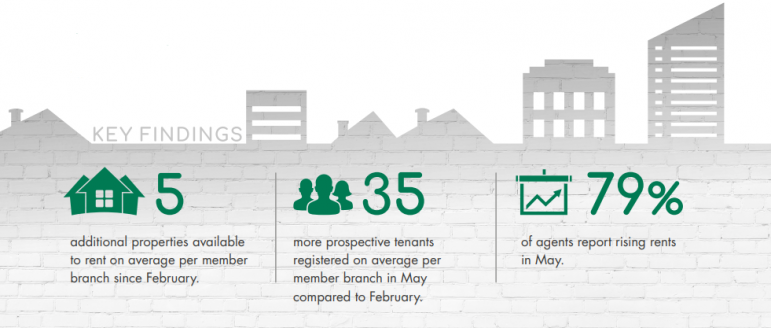
The government’s proposal to abolish Section 21 of the Housing Act and reforming the grounds for possession, as part of a new Renters’ Reform Bill, is viewed by many buy-to-let landlords as another attack against landlords who provide crucial housing for private renters.
If Section 21 is scrapped, Section 8 must be reformed. Without this, supply in the PRS will almost certainly fall which will have the consequential effect of raising rents and will further discourage new landlords from investing in the sector.
Nathan Emerson, CEO Propertymark, commented: “Pressures on the sector are not easing, especially in England given that the recent Renters’ Reform White Paper has now been published.
“What’s important is that landlords understand that this paper is a set of proposals and that there is still a process of debate and discussion before any legislation is brought in. The UK government have also committed to ensuring landlords have access to their properties via a revised section 8 notice.”
The widening supply-demand imbalance in the PRS continue to push rents higher.
Propertymark reports that there has been an increase in availability of properties to rent since February, but demand from prospective tenants has also risen.
The latest research from the trade body shows that its members reported having 10 properties on average per member branch that were available to rent in May. This is very similar to April’s figure, suggesting that little has changed in terms of new stock levels since last month.
An average of 113 new applicants were registered per member branch in May. This is up since February when 78 new applicants were registered on average. This slow and steady rise appears to mirror the increase in available lets. As rises in demand match increases in available homes, pressure on rents is set to continue.
Agents reported in May that the average void period between tenancies is below two weeks. This is over one week less than the long-run average for May which is a little over three (2015-2019).
Some 79% of member agents reported month-on-month rent prices increasing in May. Pressure on rents has been steadfast since spring last year.
Emerson added: “Given the ever-widening gap between supply of homes and demand, it is crucial that government’s across all nations prioritise reforms that incentivise new and existing investment in the sector.”


Yes they may be time to discuss but Government WILL DO AWAY WITH S21 come what may as they are in bed with Shelter. Like ALL consulations used by Government and Local Authorities they stack to the questions to get the asnwers they want. These fools think the public do not realise what is going on. This is a form of corruption in my opinion. They have been climbing the greasy pole and are about to slip down to the bottom! Landlords are dispposalable in their version of life. It will come to pass they they will pay the price for biting the hand that feeds them as the housing Crisis will grow. They have destroyed the confidence to invest in the PRS. Homelessness will increase and SHELTER and The GOVERNMENT are the architects of this soon to be crisis. The slimeballs will of course blame everyone and probably landlords their favourite target. Who will suffer? Tenants as landlords sell up. The poorer the tenant the more they will be adversely affected, the higher risk tenants can just say good bye to taking a new tenancy as these will be reserved for the low risk quality tenants, of which there are many, if you have decent properties. Bye bye Boris bye bye! Mrs May did you well promising abolition of S21 and you were gulliable enough to think it will buy left wing you votes. It might but you will pay the price.
You must be logged in to like or dislike this comments.
Click to login
Don't have an account? Click here to register
Boris, the government, Shelter, Polly Bleat and her friends at GR etc will learn about the law of unintended consequences. A group of us use to have four B2L to supplement our pensions, after Gordon McBroon raided them. One has been sold, another will be sold before April 2023 and the remaining two in the following two years to avoid additional CGT. All will be sold to owner occupiers.
Don’t wrry though, Polly, Lloyds Bank, John Lewis etc will be riding to your rescue in a few years time.
You must be logged in to like or dislike this comments.
Click to login
Don't have an account? Click here to register
As a landlord of twenty years, experience has taught me to focus on one area of the market. My choice – HMO’s, specifically the student market. Reading the White Paper I’m confident that all other landlords and agents that service this sector of the market are scratching their heads as to how the White Paper’s proposals are going to work both for us AND students as fixed term agreements suit all of us, parent guarantors included.
I have no problem at all with all of the other provisions (decent homes etc (except the pets bit obviously!)) but cannot for the life of me understand what that’s got to do with the type of tenancy. They are two separate issues and need to be addressed separately.
I’ve no idea who might read this but if there is anyone of influence that does then I suggest you look at the German model (where I live) as well as the French model (of which I am also familiar with). The vast majority of tenancies are very similar to those being proposed in the White Paper but some fixed term agreements are also permitted in order to cater for and serve a variety of situations and markets eg students, contractors working away for 6 months/a year, renting in between buying and selling, winter lets, letting one’s house while on secondment.. the list goes on….
Surely it is not beyond the wit of both the industry and Government to come up with laws and regulations that improve both security of tenure and the quality of rented property whilst at the same time facilitating and enabling an increase in supply to serve the needs of different sectors. It is clear to me that is the White Paper goes through as is many thousands PRS landlords will just give up and many thousands of properties currently let will just disappear. Here’s a few ideas:
1. Exempt furnished properties/HMO’s (student, contractors, winter let markets)
2. Have a minimum letting period
3. Exempt properties that are main residence
You must be logged in to like or dislike this comments.
Click to login
Don't have an account? Click here to register